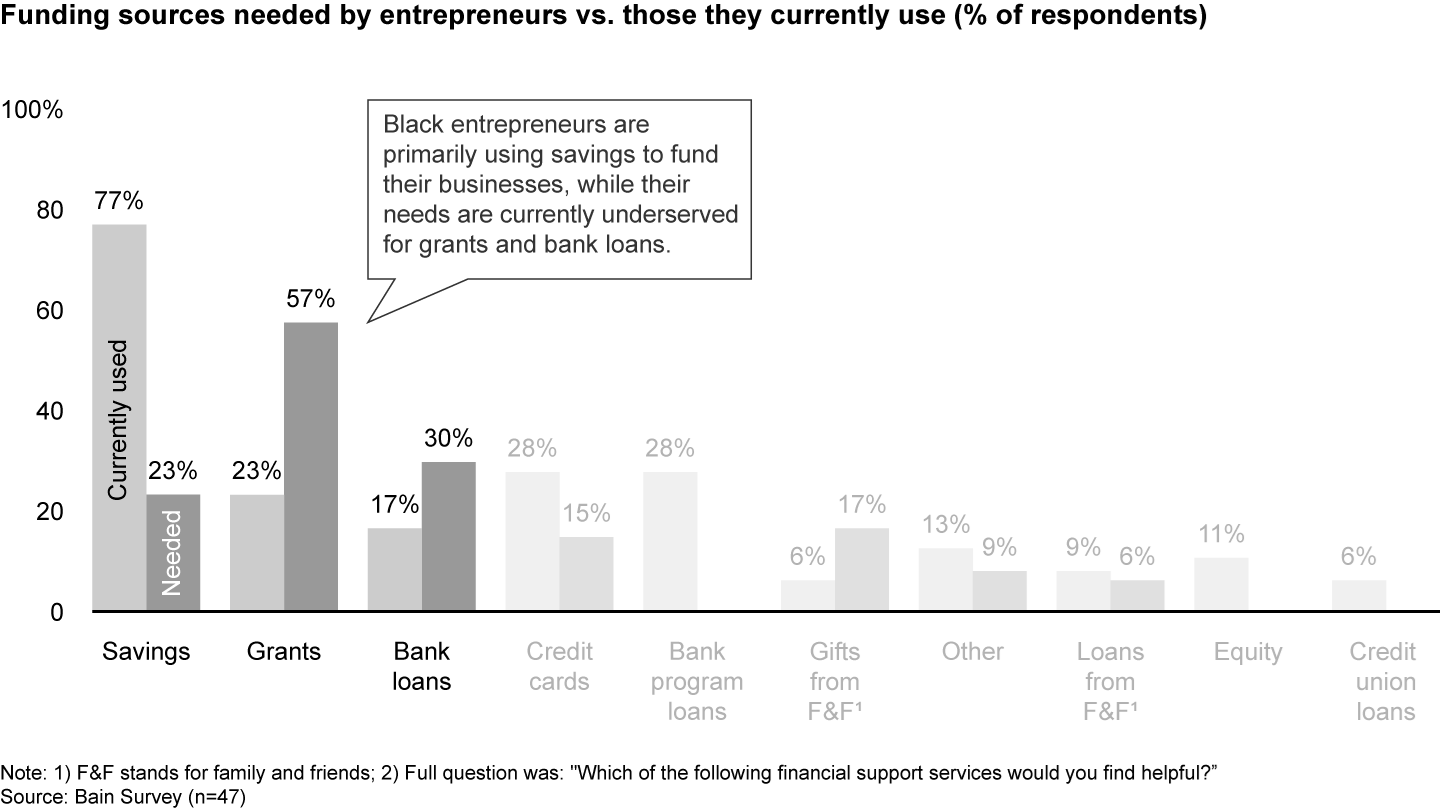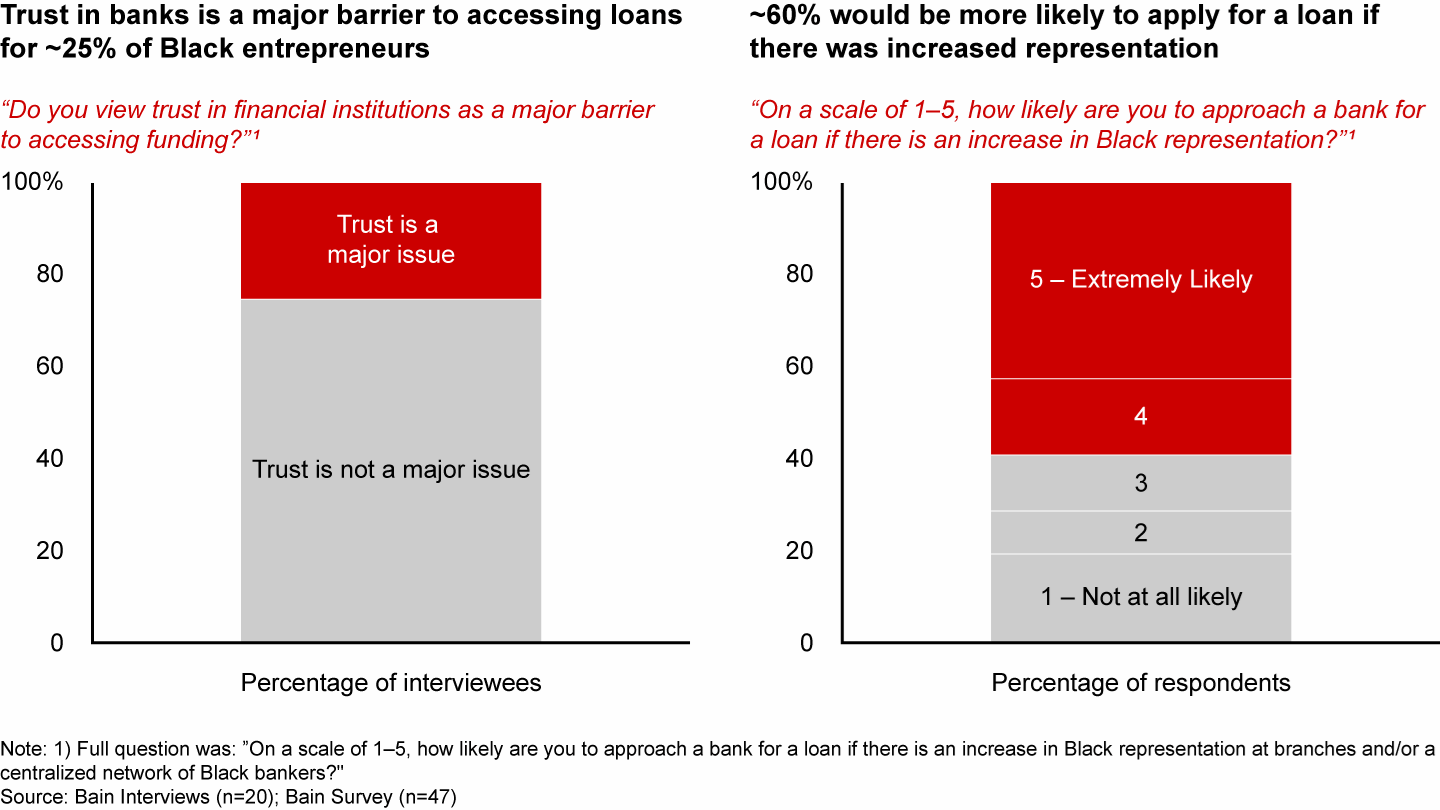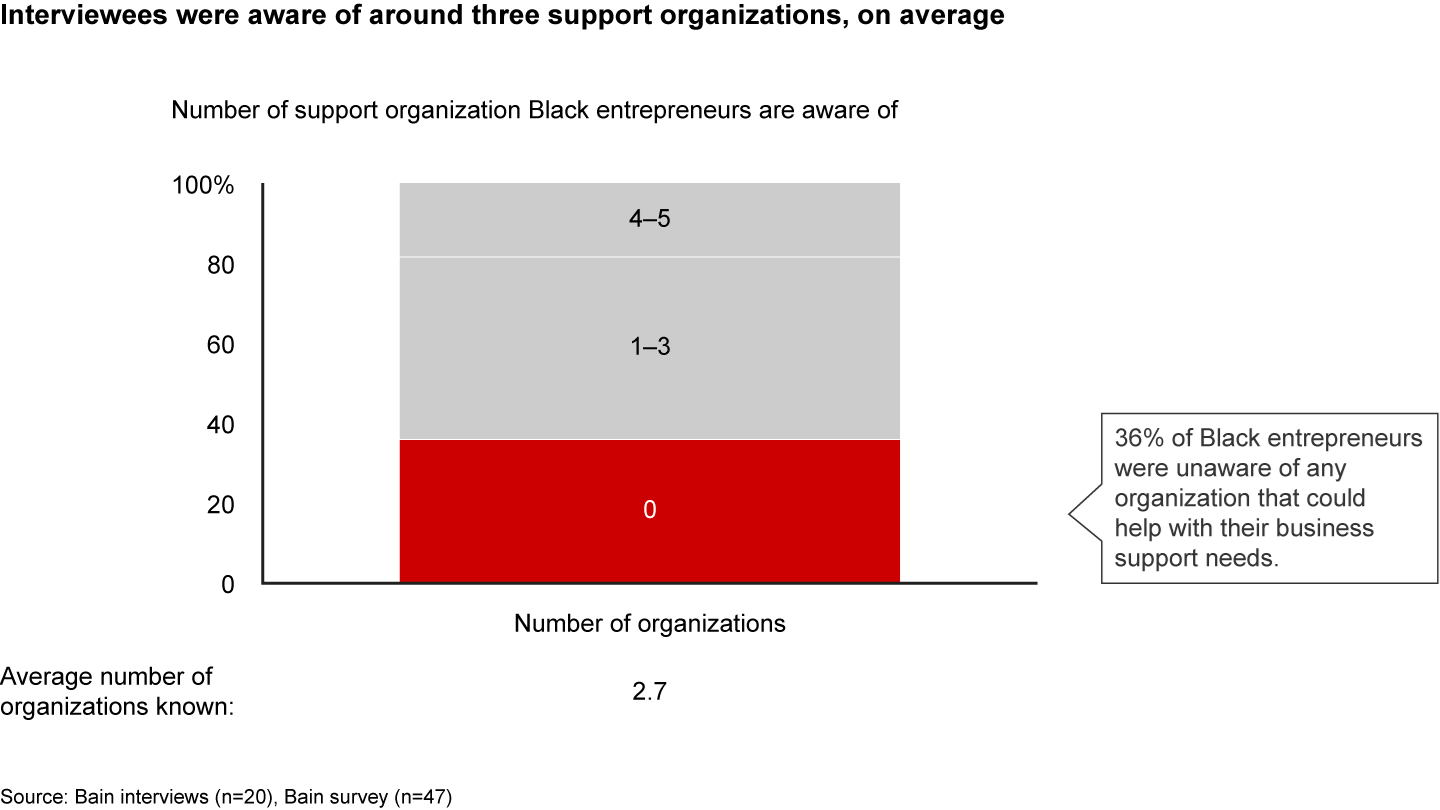Brief

In evidenza
- In Canada, systemic barriers hinder access to funding, mentorship, education, and services for Black entrepreneurs, which results in inequitable outcomes compared to their white counterparts.
- Removing these barriers would enable more Black-owned businesses to grow revenue and reach maturity.
- The business community can break down systemic barriers with training, mentorship programs, and stronger networks for Black entrepreneurs. Financial services organizations can adopt more equitable lending criteria and increase Black representation on the front lines.
- The BlackNorth Initiative (BNI) and Bain & Company developed the Black Entrepreneurship Growth and Innovation Network (B.E.G.I.N.) to address these barriers as part of BNI’s ambition to eliminate systemic racism in Canada.
While entrepreneurship is a challenging path, Black business owners face unique obstacles.
Canadian Black entrepreneurs report having difficulty accessing funding and having less access to established mentors and professional networks. They’re also less likely to receive formal business education than their white counterparts.
Written in collaboration with
Written in collaboration with

As a result, Black business owners describe “hitting a glass ceiling” in terms of revenue growth, and their businesses fail at a higher rate than businesses run by white entrepreneurs.
Why do these barriers exist? And more importantly, what can be done?
The BlackNorth Initiative (BNI) partnered with Bain & Company to find out. We spent several months surveying and interviewing Canadian Black entrepreneurs and examining national and international research to learn about issues that affect Black businesses leaders.
We documented several systemic barriers for Black businesses, particularly during the critical start-up and growth stages when businesses are most fragile. We also paired those challenges with practical recommendations for the business community, which can unlock growth and financial returns.
Entrepreneurs play a vital role in the Canadian economy, and we need to ensure systemic barriers do not prevent those with viable businesses from succeeding. If we empower Black entrepreneurs and increase their representation in business, we can create more economic potential. Moreover, economic empowerment is a critical pillar of eliminating inequities that stem from systemic racism.
And there’s a huge potential payoff, in addition to the moral imperative. In other countries, investors have unlocked tremendous opportunities by helping minority-owned businesses achieve parity with their white-owned counterparts.
Shining a light on inequities is only one step toward a more level playing field. When these obstacles are removed, more Black-owned Canadian businesses can grow, mature, and thrive.
A snapshot of Black entrepreneurship in Canada
According to Statistics Canada, there are around 67,000 Black entrepreneurs in Canada. And many of them are struggling to reach their full potential.
In Canada, the return on assets and profit margins for Black-owned businesses are below the average levels for white-owned businesses. About 72% of Black entrepreneurs earn annual revenues below $50K. In our research, 80% of Black entrepreneurs said they use personal savings to fund their businesses (see Figure 1).
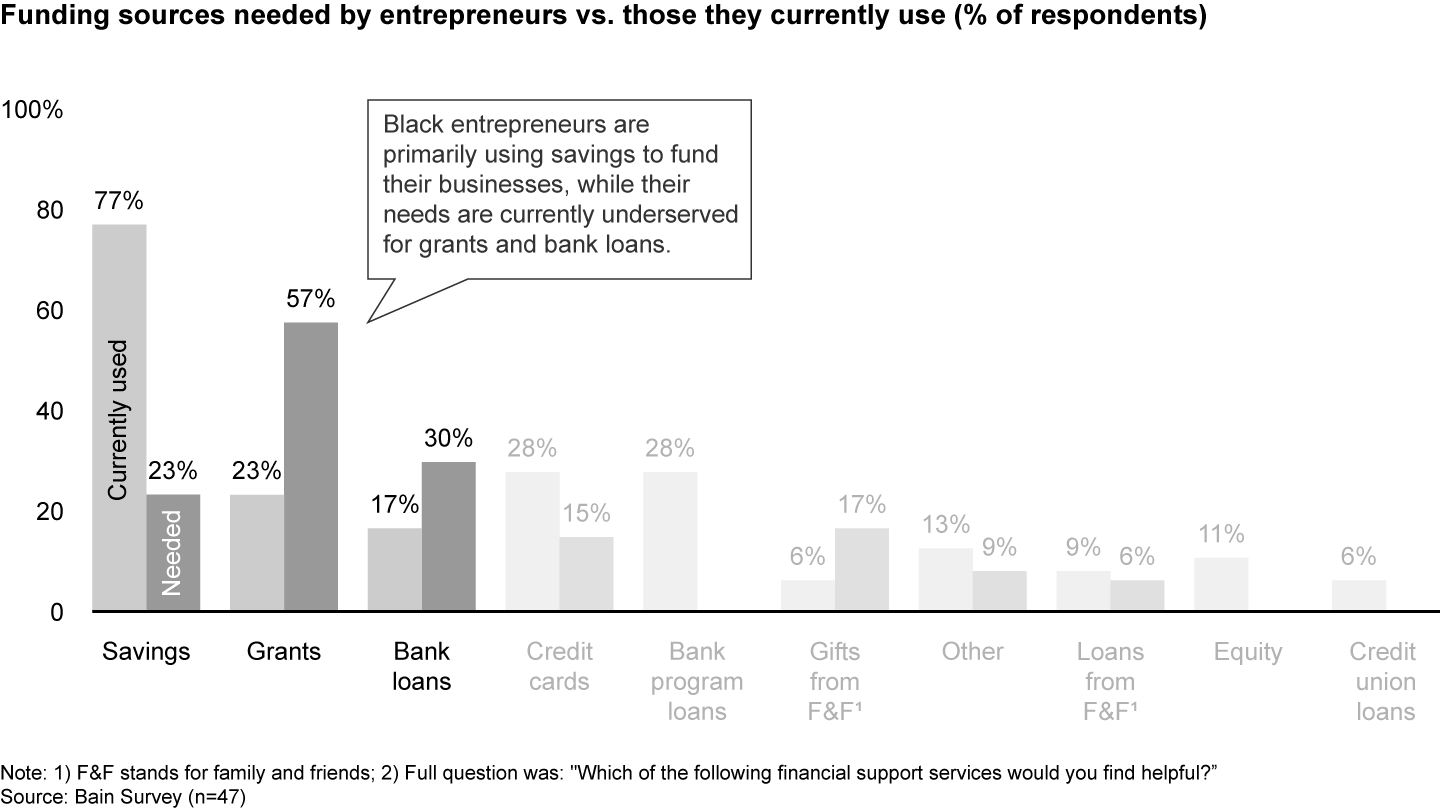
Black-owned companies are also more vulnerable to macroeconomic shocks. In 2020, during the Covid-19 pandemic, 92% of Canadian Black-owned small businesses said they experienced financial challenges vs. 79% of white-owned businesses. Minority-owned businesses also reported higher than average revenue declines in 2020.
Disparities of this magnitude—and that affect a distinct subset of business owners—point to longstanding and systemic barriers.
Unique challenges faced by Black entrepreneurs
Our research identified several obstacles that Black-owned businesses face in Canada: difficulty accessing funding, a lack of representation in the business community and financial services, deficits in training, and insufficient business support.
Barriers to accessing funding
Black entrepreneurs said their biggest challenge is securing adequate funding. Two-thirds of Black entrepreneurs would have difficulty finding $10,000 to support their business, according to a 2021 study by Abacus Data.
In our interviews, many Black entrepreneurs reported not having credit cards and held negative associations with credit card debt. “Culturally, accessing credit is not a thing for us,” one interviewee said.
Interviewees also believed credit wasn’t available for people “like them.” And the data support their perception: Black-owned firms are less likely to be approved for loans by banks or fintechs compared to similar white-owned firms, according to the Bank of Canada. Corporate funding opportunities focused on Black entrepreneurs are also few and far between.
Angel investors and venture capital (VC) firms are another funding avenue for early-stage Black-owned businesses. However, VC firms expect higher and faster returns to compensate for the increased risk, according to respondents. Or they demand equity stakes that are so high they may seem predatory, which degrades trust. In prior Bain research, Black entrepreneurs cited a fundamental mismatch between their goals and those of investors.
“I’d be forced to scale quickly for people who don’t care about my long-term success and want disproportionate growth in the short term,” one interviewee said. “Whatever it would take to do that would not be in my best interest or the best interest of my business.”
As a result, grants—often from governments—are the preferred funding source for more than half of Black entrepreneurs, despite low payouts and onerous processes. Grant awards are typically less than $5,000, which forces entrepreneurs to secure multiple sources of funding and limits their growth. Black entrepreneurs also have an incomplete view of grant opportunities that are available to them—and not enough time or resources to prepare winning proposals.
Lack of Black representation in the business community
About 70% of Black entrepreneurs believe “good advice” is key to accessing funding. But only 10% are getting support they need.
Black entrepreneurs told us they need more education, networking, and outsourced services to grow. And they trust Black-led organizations the most. “It is crucial for me to be able to convene with people who are like me,” one respondent said. “Black women, who are also business owners, and also creatives.”
Another respondent said, “There needs to be a bigger community for Black businesses and entrepreneurs. We could be telling stories and helping each other navigate some of the complexities of building a business.”
Instead, many Black business owners rely on family and friends who may not have entrepreneurial experience.
Mentors and professional networks can be an enduring source of support. They can help entrepreneurs navigate everything from business basics to product viability and the VC environment. But here’s the catch: because Black professionals are underrepresented in the business community, there are too few mentors for Black entrepreneurs to lean on.
Inequitable access to business education
About 70% of Black entrepreneurs said they need more education to help them succeed. Respondents want more training in technology, business fundamentals, marketing, and accounting.
Black entrepreneurs said they feel “underprepared” to apply for loans from traditional financial institutions. Most banks require detailed business plans and financial projections, especially when applicants lack collateral.
One respondent explained, “a lot of Black entrepreneurs have great ideas, but they don’t have financial knowledge. They’re filing taxes for the first time, doing their own bookkeeping, and figuring out marketing by themselves. They can’t provide the level of detail that banks want.”
In addition, about 60% of Canada’s Black entrepreneurs are immigrants. Typically, these leaders are starting new businesses, not taking over the reins of multigenerational companies. That means they don’t have predecessors to “show them the ropes” or share best practices and local business contacts.
Distrust of financial systems
About 25% of respondents said “lack of trust” in financial institutions is a major barrier to accessing loans (see Figure 2). In research by Abacus Data, only 19% of Black entrepreneurs said they trust banks to do what is right for them and the community.
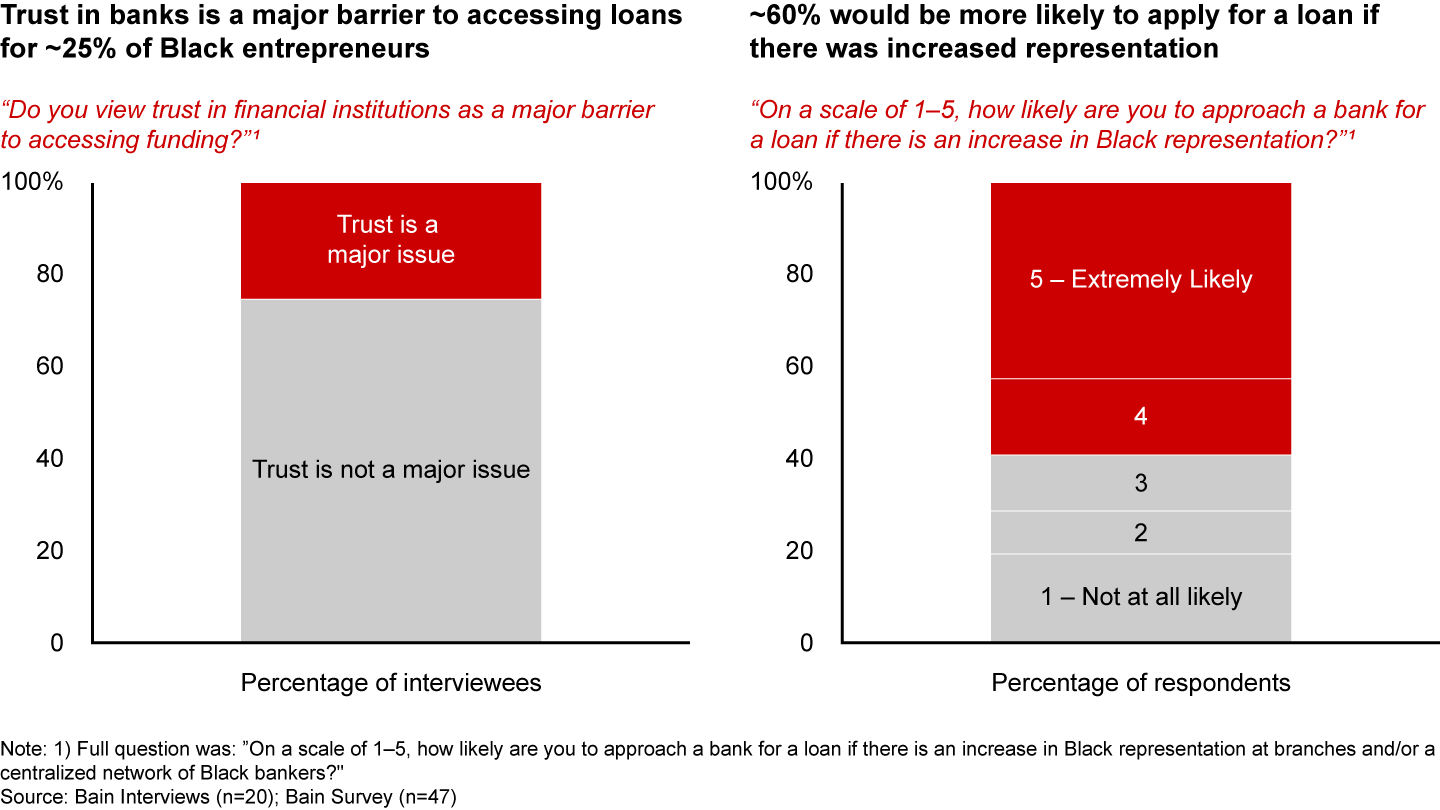
Interviewees said their distrust stems from a lack of representation in the loan process and high decline rates. About 45% of respondents believe their race is a barrier to accessing funding.
“I haven’t bothered approaching a bank for a loan because I’m not sure they’d approve a loan for someone who looks like me,” one respondent said.
Lack of trust perpetuates an unfortunate cycle. Without funding, business growth is slower and more costly for Black entrepreneurs, which also makes it harder to secure funding.
Major financial institutions have launched loan programs for Black entrepreneurs, but it’s unclear how well they’re working. There’s little or no data available on approval rates or loan amounts, and it’s difficult to tell how these programs differ from traditional lending products. For example, traditional lending criteria rely on performance measures that disadvantage Black applicants, such as collateral and revenue.
Barriers to accessing support services
Black entrepreneurs said they need the most support with marketing, accounting, and taxes—but most don’t know how or where to find it.
About 35% of the Black entrepreneurs we surveyed weren’t aware of external organizations that could support their business (see Figure 3). In other research, less than a quarter of Black entrepreneurs were aware of programs offered by the Business Development Bank of Canada and Export Development Canada, two of the country’s largest federally funded programs for business support.
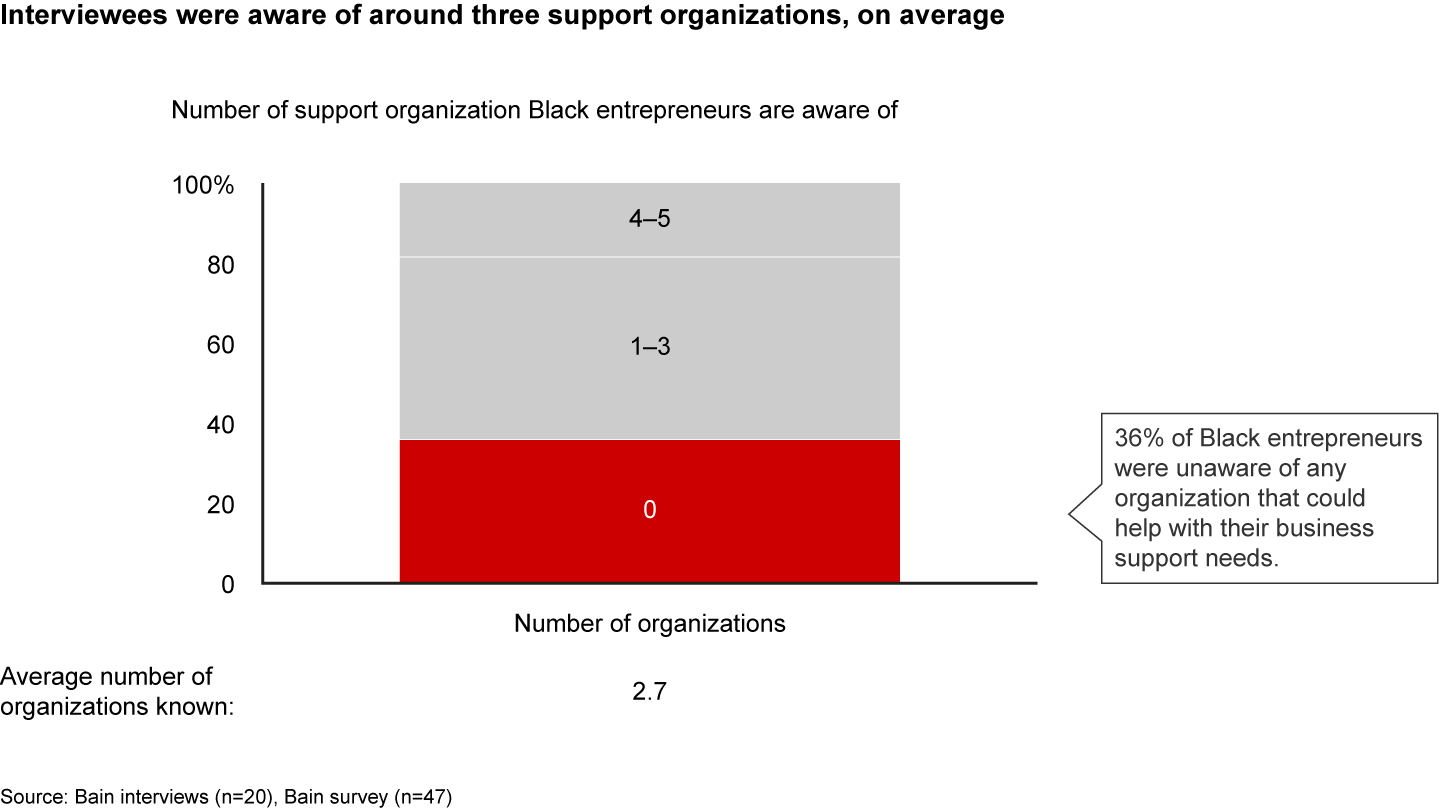
Entrepreneurs who knew about support offerings were aware of three providers, on average, and typically learned about them through word of mouth or online research.
When Black entrepreneurs pursued professional support, they said services were highly fragmented and difficult to navigate, so they had to invest a lot of time researching and coordinating services. They encountered dead links, outdated information, and unclear application criteria. And some entrepreneur programs were only available for a limited time. Support stopped once the program ended.
How to dismantle barriers for Black-owned businesses
Several initiatives have been launched to support the Black entrepreneurial community in Canada. For example, in 2019, the government committed $25 million to Supporting Black Canadian Communities, an initiative that fosters knowledge-sharing and capacity-building in Black Canadian communities. Many other organizations in the Black community are also doing important and meaningful work. However, these efforts are still young and building capacity. They have not been adequately supported with the resources, connectivity, and infrastructure they require to create the impact the community needs.
To start, financial institutions can level the playing field by addressing Black entrepreneurs’ financial needs and implementing more equitable lending practices. Angel investors and VC firms should consider creating more funding options specifically for Black-owned businesses. Financial institutions, angel investors, and VC firms naturally mentor and sponsor many of the businesses they invest in to guarantee their returns. The Black business community deserves (and needs) no less.
With targeted initiatives, banks, VC environments, and supporting organizations can increase Black representation, particularly in roles that adjudicate funding. More than half of Black entrepreneurs (60%) said they would feel more comfortable approaching a financial institution if there was greater Black representation.
Financial institutions should reach out to Black entrepreneurs to learn about their unique financial challenges and to develop a “culturally competent lens.” For example, Black entrepreneurs may have less credit history because they are reluctant to borrow money as a cultural norm—not because their businesses are a riskier investment. A culturally competent view might consider different lending criteria. While Black-owned businesses tend to have lower cash flows and less capital, they also have lower levels of spending and debt. Investors and financial institutions must acknowledge the barriers Black entrepreneurs face and work to address them without bias.
A new platform for Black-owned business growth
Bain and BNI developed Black Entrepreneurship Growth and Innovation Network (B.E.G.I.N.), a one-stop shop for Black entrepreneurs across Canada. The web platform aims to amplify the impact of existing resources and introduce new solutions and support for Black entrepreneurs.
B.E.G.I.N. will launch in fall 2023 to address topics and issues that Black entrepreneurs said were the most important and relevant to their success. The platform is designed to increase access to funding, support services, and networking. It will include directories of funding sources and start-up incubators, free educational resources, and calendars of networking events.
The site will also feature discounted and pro-bono offers from major Canadian businesses for goods and services that are most critical in the early stages of entrepreneurship, such as legal support and tax filing services.
To facilitate mentorship, B.E.G.I.N. will connect Black business owners with mentors who have relevant, industry-specific knowledge. Mentors can recommend vendors and training, help entrepreneurs approach investors, and offer general insights into the entrepreneurial landscape.
The ambitious, long-term vision for the platform includes more comprehensive services for Black entrepreneurs and personalized support, ranging from help finding resources to preparing funding applications.
“It was extremely important for us to develop a digital solution for Black entrepreneurs,” said Dahabo Ahmed-Omer, CEO of BNI. “Ultimately, we hope to remove fundamental barriers for Black entrepreneurs, like access to capital funding.
“If we can empower individual entrepreneurs through B.E.G.I.N., we can drive economic growth and create a more inclusive and equitable future for all,” she said.
Barriers are not the end of the story. They can be broken. The business community and investors have the power—and the opportunity—to change the trajectory of Black-owned businesses in Canada. Removing systemic barriers is a critical step in a long and necessary journey.
The authors wish to recognize the invaluable contributions of others in supporting this work, including Tamara Tuqan, program associate at BNI, and Zak Overy and Katelyn Kozma, who are both consultants with Bain.

About BlackNorth Initiative
The BlackNorth Initiative is on a mission to end anti-Black systemic racism throughout all aspects of our lives by utilizing a business-first mindset. We are committed to the removal of anti-Black systemic barriers negatively affecting the lives of Black Canadians. For more information, visit: https://blacknorth.ca/ and follow us on social media @blacknorthca.
